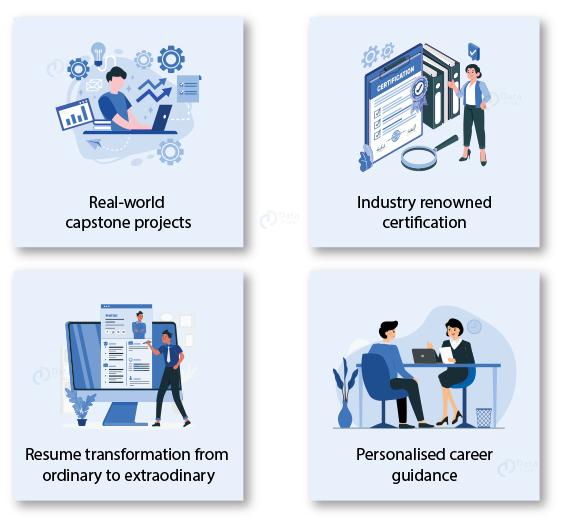Free Java Servlet Certification Course [Hindi]
 Servlets are Java-based components that generate content on any web server, dynamically. In this Java Servlet course we will learn the applications and use of Servlets on various platforms. This will help you in grasping Java programming to another level. Let’s begin!
Servlets are Java-based components that generate content on any web server, dynamically. In this Java Servlet course we will learn the applications and use of Servlets on various platforms. This will help you in grasping Java programming to another level. Let’s begin!
What will you take home from this Free Servlet Course?
- Self-paced video course
- 170+ hrs of study material, practicals, quizzes
- Acquire practical knowledge which industry needs
- Practical Servlet course with real-time case-studies
- Lifetime access with industry renowned certification
Why should you enroll in this Free Servlet course?
- Java programming expertise is required for creating web applications
- Comprehensive knowledge of the Servlet architecture and lifecycle
- Abilities to create dynamic content and manage client needs
- Understanding of web application state maintenance and session management
- The capacity to modify requests and responses using servlet filters
- Knowing how to track web application lifecycle events with servlet listeners
- Discover the principles of Servlet-based web application development
- Get practical experience creating dynamic, interactive websites
- Learn important ideas like filters, session management, and request processing
- Land on various prosperous job opportunities in the IT sector
- Having in-demand Java EE knowledge will provide you a competitive edge in the employment market
- After course completion, get an industry-recognized credential
- Access to real-world projects, interactive quizzes, and practical exercises
- Learn from seasoned professionals with a track record of effective instruction
- Flexible learning options include instructor-led training or self-paced learning
- Join a learning group to exchange knowledge and experiences
- Get updates and lifetime access to the course content
- Practical knowledge of the technology and tools used in enterprise web development
- Opportunities to network and engage with other professionals who share your interests
- Improve your Java programming abilities to become a more adaptable developer
Java Servlet Course Objectives
You will gain a thorough understanding of Java Servlets in this course, as well as how important they are to web development. This Java Servlet course will provide you with the skills and knowledge necessary to create dynamic and interactive web apps, whether you’re new to web programming or looking to improve your abilities.
You will learn the foundational concepts of Servlets throughout this Java Servlet course, including their lifecycle, request and response handling, and session management. By guiding you through practical exercises and projects that mirror real-world situations, we’ll give you the self-assurance you need to take on challenging web development tasks. By the end of this Java Servlet course, you’ll have a solid understanding of Servlets and be prepared to build effective, scalable, and reliable online applications.
Benefiting from this Java Servlet course is an opportunity of a lifetime since it will serve you great success and prosperity in the Information and Technology industry. Through this Java Servlet course you will get to enhance your aptitude skills and perform dynamic functions for every unique program.
The goal of the Servlet course is to give participants a thorough and in-depth grasp of Java Servlets and their crucial function in the creation of web applications. Participants will explore the complexities of server-side programming throughout the course, giving them the knowledge and abilities needed to create dynamic and interactive online applications.
This training’s explanation of the architecture and lifecycle of Java Servlets is one of its main goals. Participants will obtain an understanding of how servlets handle HTTP requests and responses in order to create effective and responsive web applications. Participants will learn how to use servlet containers to create strong online solutions by exploring their complexities through a hands-on approach.
This Java Servlet course’s introduction of the Model-View-Controller (MVC) architecture in the context of servlets is another important goal. This architectural pattern is essential for creating online applications that are scalable, maintainable, and modular. Participants will comprehend how data management, user interface, and control logic are separate issues, enabling them to create complex programmes with a logical framework.
The overall goal of this Java Servlet course is to develop skilled, self-assured developers who can use Java Servlets to build dynamic, secure, and feature-rich online applications. Participants will be well-equipped to start a successful web development journey and make substantial contributions to the digital landscape through a blend of theoretical understanding and practical execution.
Why should you learn Java Servlet?
Java Programming service is always in high demand in the IT sector and Servlet is one such important factor of Java Programming itself. It is used to increase the capabilities of the servers. The host applications get to access these services through a request-response programming model. It is advantageous for Servlets that they can respond to any type of server.
Servlets wide opens the possibility to create numerous programming models and amazing possibilities to discover what’s new in this industry. Through this course you will be given the opportunity to bag amazing skills in Java Programming.
- Java servlets offer a reliable and effective means of developing dynamic web applications. –The Oracle
- If your goal is Back-End Development, then servlets are the direct key to it.
- A survey found that “over 80% of enterprises use Java for building web applications.”
- “Servlets have the benefit of being easy to deploy and independent of platforms.” –Developer.com
- Someone skilled in Java Servlets can easily work at enterprise-level applications.
- The foundation of Java EE, a well-liked framework for enterprise applications, is made up of servlets.
- Learning Servlets simultaneously makes you a pro at HTTP methods.
What is Java Servlet?
On a web server, servlets are Java-based components that dynamically produce content. They are a crucial part of Java EE (Enterprise Edition), which is used to build web applications that communicate with clients over HTTP. Developers can handle requests and responses, manage session data, and carry out numerous operations throughout the lifecycle of the web application using servlets.
Servlets are extremely adaptable and useful in a variety of web-based applications. They provide an effective means to handle form submissions, manage user interactions, and provide dynamic HTML content that is catered to particular users or particular scenarios.
These Java classes function within a servlet container, a component of a web server that controls the servlet lifecycle. Incoming requests are handled by the container, which also launches servlet instances as necessary and manages their execution. Servlets can be platform-independent and adaptable to different web servers thanks to their architecture.
What to do before you begin?
Servlets is an intricate component of Java language. It deals with complexity as the end result is extremely prosperous. Since this course is meant to groom the beginners and sharpen the intermediates, the end goal is to become an expert in Servlets application. This course contains every detail from A to Z about Servlets, but if you like to, we have suggested some prerequisites for you to make this learning journey more effective and interesting.
- Foundational knowledge of Java Programming
- Basic concepts of HTTP and HTML
- Knowledge of an integrated development environment (IDE) or text editor for programming.
- Requirement of Java Development Kit (JDK) in the system.
It will be much easier and beneficial to study the course material efficiently if you have a basic understanding of Java programming and web development fundamentals.
Who should go for this free Java Servlet course?
Learning Servlets under Java programming, gives you an edge from the rest of the Java Programmers. It opens more work opportunities and research projects in the IT sector. With this course, you will not only learn the fundamentals and advancements of Servlets but also get a tight hold on HTTP concepts. This training will help you in a number of ways which are mentioned below:
- Aspirant web developers trying to break into the industry.
- Aspiring web developers who are already proficient in Java Servlets.
- Students in computer science who want to gain more practical experience.
- Professionals looking to transition into the software development industry.
- People that want to build their own dynamic web applications.
By enrolling in our Java Servlet course, you can expect the following benefits:
The Java Servlet course provides in-depth knowledge and hands-on skills for creating dynamic, interactive web applications. This training may greatly improve your web development skills, regardless of your level of experience, and it can also lead to a variety of new professional prospects.
- Servlet courses give you the knowledge and abilities you need to create reliable server-side logic, control HTTP requests, and manage the creation of dynamic content.
- Learning Servlets improves your knowledge of Java programming, allowing you to build excellent web applications using Java’s object-oriented concepts.
- You will become familiar with the Model-View-Controller (MVC) architecture and how servlets act as controllers in your web applications to clearly separate issues.
- Session management techniques are covered in Servlet classes, enabling you to manage user sessions and store user-specific data across requests.
Participants will start by understanding the fundamental ideas behind servlets, including how they work with HTTP requests and responses to build dynamic web applications. This Java Servlet course will help users set up their development environment and install necessary tools including an Integrated Development Environment (IDE) and the Java Development Kit (JDK).
Further, participants will learn about the creation, initialization, and termination of servlet instances as they progress through this Java Servlet course. They will learn how to extract data from request parameters and develop understanding of how to manage various HTTP requests, including those that use GET and POST methods.
Database connectivity is a key component of servlet development, and the course will show participants how to integrate servlets with databases using Java Database Connectivity (JDBC). This enables them to operate databases within their apps with ease.
Participants will also learn how to successfully segregate display logic from business logic by integrating servlets with JavaServer Pages (JSP). The emphasis of the course will be on error handling and exception management, instructing students on how to handle mistakes politely in servlet-based applications.
In conclusion participants will learn the following key points-
- The foundations of Java Servlets and their function in the creation of websites.
- How to effectively handle HTTP requests and responses.
- Techniques for user authentication and session management.
- JSTL and JavaServer Pages (JSP) are used to create dynamic web pages.
- Using web apps that follow the Model-View-Controller (MVC) architecture.
Jobs after Learning this Java Servlet Course
This course of Servlet is a golden mine for those seeking a job in the IT sector. You can choose from various career options given below.
- Full-Stack Developers: Full-stack developers are involved in both the front end and back end of web applications. Your ability to develop end-to-end solutions that manage user interactions, data storage, and general application functionality will be improved by your Servlet experience.
- Back-end Developer: Back-end developers work on the server side of web applications. Your knowledge of Servlets will be essential for developing business logic, handling data, and guaranteeing the efficient operation of web services.
- Java Web Developer: You’ll use your understanding of Servlets as a Java web developer to create and maintain dynamic web applications. Writing server-side code, dealing with HTTP requests, controlling sessions, and interacting with databases will all fall under your purview.
- System Analyst: As a system analyst, you can direct development teams in creating efficient web solutions by using your expertise of Servlets to gather requirements, design system architecture, and design systems.
- Software Architect: Knowledge of Servlets will be helpful for people planning to become software architects in creating scalable and effective web application architectures.
- Engineer for application support: Understanding Servlets can help you identify and fix problems with server-side functionality in web applications.
- Freelance Developer: With your Servlet knowledge, you might work as a freelance web developer to create unique online apps for clients. This can be particularly helpful if you want a more flexible work schedule.
- Technical Consultant: If you are well-versed in Servlets and associated technologies, you could work as a technical consultant, advising companies on their web application development initiatives.
Our students are working in leading organizations

Online Java Servlet Free Training Course Curriculum
- Introduction to advanced Java
- Merits and Demerits
- Core Java
- Introduction to Java Framework
- Uses of Java Framework
- Callable Statement
- Result Set
- Result Set Meta-data
- Database Meta-data
- Transactions in JDBC
- Server-Side Programming
- Servlet Life Cycle
- javax.servlet package
- Servlet Configuration, Servlet Context, Servlet Response
- Supplying initialization parameters to Servlets
- Performing database operations in Servlets
- Application of filters in Servlets
- javax.servlet.http Package
- Http Servlet life cycle
- GET vs POST
- HTTP Servlet Request and Response
- HTTP headers and error codes
- Session Tracking
- Hidden Cookies
- URL rewriting
- Event listeners
- Web application Security
- Introduction to JSP
- Advantages of JSP
- Disadvantages of JSP
- Dynamic web content development with JSP
- Scripting elements
- Scriptlet
- Declaration
- Expression
- XML syntax for JSP elements
- JSP directives page, include and taglib
- JSP implicit objects
- Application of Java bean in JSP
- JSP architecture model 1 and 2
- Custom Tag development
- Classic tags, simple tags
- Error handling in JSP
- JSTL
- Processing XML in JSP
Features of Java Servlet Free Course


